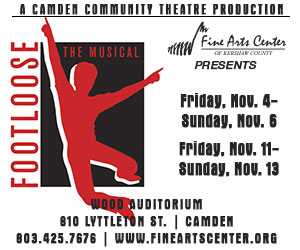A Review of Head off & Split by Ray McManus
Nikki Finney’s latest book of poetry, Head Off & Split, is the winner of the 2011 National Book Award. To anyone who is familiar with Finney’s work, this should not come as a surprise. In addition to Head Off & Split (of which I’ll talk about later), Finney’s books of poetry include The World is Round (2003), Heartwood (1997), Rice (1995), and On Wings Made of Gauze (1985) – all strong collections, with an undeniable voice of clarity, and matter of fact poignancy. In other words, it was only a matter of time. What does come as a surprise, however, is the fact that for the second year in a row, a native of South Carolina has won the National Book Award for Poetry (Terrance Hayes won in 2010). For fellow natives, this only confirms what so many of us have believed – that South Carolina is a landscape rich with poets whose voices belong in the larger conversation, that poets from the South have something to enhance and complicate the canon of modern and contemporary poetry.
It’s no wonder that poets from South Carolina exist. For all its beauty and determination, it is truly heartbreaking to live here, and can offer less to leave here. It’s our history – divided, politically charged, white-washed, in constant turmoil with itself and with the present. Head off & Split inhabits both politics and history. As Finney stated in an interview with Cat Richardson, she is “incredibly drawn to history; personal history, American history, Southern history, family history, the history of a community, the history of secrets, the history that has gone missing, the history that has been told by the lion hunter but not the lion, the history of pencils, of loss, of tenderness.” And then there is the present. In an interview, Kwame Dawes stated that he writes poetry to make sense out of the madness of the present, to civilize the uncivilized. Poets looking toward the madness of the present find a reflection of the cruelty of the past. To wrestle with that, the poet has to be very careful not to make sense of one and run the risk of making an excuse of the other. So many aren’t careful or take the easy route and point to the obvious, and their work falls flat, takes no risk, reveals no insight. Head Off & Split does anything but fall flat. It’s daring. It’s wild. And it doesn’t hold back what the poet wants to say. From the scope of the collection to the individual poems, Finney pushes fearlessly with urgency. She is not pushing us away; rather, she pulls us in to show us, to help us understand, to remind us as in the poem “Heirloom” that “there is practice for everything in life. This is how you throw something perfectly good away.”
We begin the book with “Resurrection of the Errand Girl: An Introduction,” a prose piece that is one part prose poem, and one part ars poetica. It opens the book as a “whole fish” that is “wrapped in yesterday’s news” and we are meant to see it kept whole, guts and all. So when the first section titled “The Hard ∙ Headed” opens with “Red Velvet,” a poem dedicated to Rosa Parks, we can quickly see that Finney wants us to understand the totality of keeping it whole despite what people say, despite what history says or how it says it. There is a quiet revolution that exists in one’s determination. We see this again in “My Time Up with You,” where Mayree Monroe stands defiant against “young Tom Brokaw” and hurricane Rita. The last lines hold steady: “I will be here ‘til the end.” Rosa and Mayree are real and one in the same, but more importantly they remind most of us what we are not – strong. Take for instance “Plunder,” a brilliant collection of intertwined sonnets that on one hand exposes the ignorance and lack of compassion by previous leadership, and on the other calls out those who applauded. Then there is the “The Condoleeza Suite,” a series of poems that exposes the icon of what people consider to be powerful, talented, and beautiful (the concert pianist and former Secretary of State Condoleeza Rice) as someone who may have gotten somewhere, but at what price:
She is fifteen again, all smiles, and relocated
to the peaks of the Rocky Mountains,
where she and the Steinway
are the only Black people in the room.
Pit these two poems that close out the first section against the poems of the second section –“The Head ∙ over ∙ Heals,” where a girl welcomes the lightning strike to “lose her obeying-girl tongue” as in “Thunderbolt of Jove,” or the “grown woman in grease-pocket overalls inside her own sexy transmission despite the crowding of hurled red hots” as in “The Aureole,” or the voice in probably one of the best love poems I have read in a long time in “Orangerie,” and the unflinching command of “The Clitoris”– and it becomes evident that what most consider strong is a lie. Strength doesn’t come from history; it doesn’t come from politics. It comes from within. It sounds cliché, but how often is that forgotten. When we begin the final section, “The Head ∙ Waters,” we are greeted with the poem “Dancing with Strom,” a poem whose subject matter is familiar to any South Carolinian. The poem begins with a quote from Strom’s racist past. Throughout the poem, Strom is dancing with the women at the wedding. But it’s the speaker who refuses to dance with him by not falling victim to language and by seizing the power of the symbol that represents strength, in this case the porch:
History does not keep books on the
handiwork of slaves. But the enslaved
who built this Big House, long before
I arrived for this big wedding, knew
the power of a porch.
But language is a symbol, one that can easily be untrue, or worse misused by people who have no idea what they are saying. In same interview with Richardson, Finney stated: “I am hoping that the reader realizes we are standing at an incredible moment in time. A moment when so much of what we do and don’t do matters. I believe more and more our beautiful language is being hi-jacked by those who care nothing about language …language has been stolen and stomped on and sold into sound bites…” And when we get to the last poem, “Instruction, Final: To Brown Poets from Black Girl with Silver Leica,” where the poet points out that it is the diamondback terrapin that “can outrun a hurricane,” that “two-fisted is not the same as two-faced,” and to be “careful to the very end what you deny, dismiss, &cut away,” we remember that she is talking to us.






.jpg)
